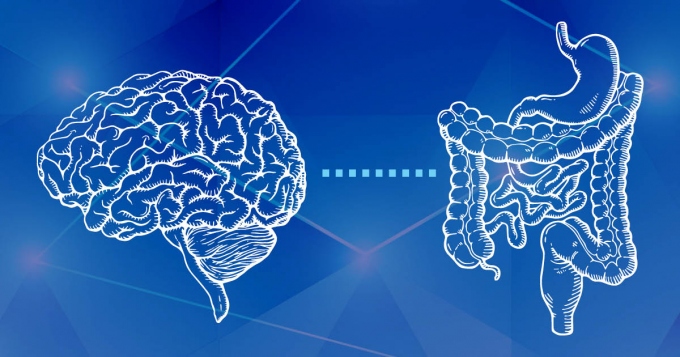When I was in my late teens, I was undergoing examinations for my International Baccalaureate (IB) diploma. As a person that does not normally handle stress entirely too well, this had me under what felt to me was a lot of pressure. During this time I remember experiencing various stomach issues. Shortly after that the Doctor informed me I had IBS (irritable bowel syndrome) that was most probably aggravated by stress. This was in the late 90s.
Today, there are numerous connections being made that claim that there most definitely exists a gut-brain connection. Some people refer to this as the gut-brain axis. There is a two-way connection and communication system between the gut and the brain. This means that what happens in the gut could directly impact both brain function and behavior. Conversely, our brain is also said to send signals and communication to our gut. For example, when our brain sees food we can sometimes feel our stomach respond with a rumble.
One popular resource about the gut-brain connection is the book The Mind-Gut Connection by Emeran Mayer, MD. Dr. Mayer explains that when the communication channel in our body of the brain, gut and microbiome is out of whack many health problems can appear. In his book, Dr. Mayer sometimes even refers to the gut as ‘the little brain!’ Dr. Mayer’s book explains that health problems that may appear when the connection is out of whack include allergies, digestive diseases, depression, anxiety and even fatigue.
As I mentioned at the onset, I was diagnosed with IBS at a young age. I have recently come to understand that stress can essentially have an effect on the movement and contractions of the GI tract, which can worsen inflammation and possibly make one more at risk of developing infections. Therapies that target stress and anxiety reduction are found to help those with digestive issues to improve symptoms. There have been studies conducted to research even further on this.
Another interesting point to note is that studies have been conducted that have been looking into the link between the gastrointestinal system and Parkinson’s disease. If this link is in fact proven, it will help to diagnose those with Parkinson’s disease at a much earlier stage than currently possible. This would mean patients could be diagnosed possibly even before exhibiting any motor symptoms. At the moment most Parkinson’s disease patients are diagnosed once they start having motor symptoms.
Even more interestingly, in recent years, several studies have revealed that high salt (sodium) intake can have significant impacts on immune changes in the gut. More recently, it has been found that excessive intake of salt can have a negative affect on brain health as well.
There was a recent study conducted to understand the link between anxiety and gut health. Researchers are optimistic that in the future they may be able to consider regulating intestinal floral to help with relieving anxiety symptoms. However, more research is still required before forming more definite conclusions on this.
Some of the other external factors that can affect our gut-brain connection include:
Probiotics
Based on the fact that gut bacteria can affect brain health – we should strive to change our gut bacteria to improve brain health. Probiotics are readily available in pharmacies across the world. Probiotics are basically live bacteria that are said to improve our gut flora. Many people have reported that symptoms of irritable bowel syndrome improve after eating probiotics for a specified time period. For some patients, probiotics have also been said to improve symptoms of inflammatory bowel diseases like Crohn’s disease and ulcerative colitis. Some probiotics have also been said to improve symptoms of stress and anxiety. Prebiotics (a type of fiber that cannot be digested by the human body) are said to function similarly to probiotics. Probiotics can either be purchased as supplements or you could increase intake of foods like yogurt, tempeh, kombucha, kefir and sauerkraut in your diet. Prebiotic sources include dandelion greens, chicory root, asparagus, Jerusalem artichoke and even onions. Prebiotics also can be taken as supplement pills.
Diet
It is said that we become what we eat. There is in fact sufficient research to back up this claim. Research findings suggest that there may be a link between the Western diet and increased inflammation. The Western diet is usually high in animal fats and proteins but low in fiber. On the other hand, the Mediterranean diet is said to be anti-inflammatory and also believed to help improve the immune system. The Mediterranean diet is usually high in fiber and low in red meat. It usually includes plenty of legumes, nuts, olive oil, fish and vegetables. A low FODMAP diet is also believed to improve gut health. The FODMAP diet restricts the consumption of fermentable carbohydrates known as oligosaccharadies, disaccharides, monosaccharides and polyols to help reduce symptoms like bloating, pain and other bowel symptoms. Recent research reveals that those that include more plant-based foods in their diets have a more diverse microbiome. It is thought that those eating higher quantities of fruits and vegetables may have a healthier microbiome.
Other Factors
It is now relatively widespread knowledge that antibiotics can negatively impact our gut flora. Our microbiomes start to develop when we are born. Recent research suggest that babies born by natural birth have been found to have higher gut bacteria counts than babies born through c-sections. This is thought to be because of the contact babies born through natural birth make with their mother’s vaginal and intestinal bacteria. There are also differences in babies that are formula fed and breast-fed. Breast-fed babies were often found to have Bifidobacterium in their guts. Bifidobacterium is a beneficial bacteria that helps to digest dietary fiber and prevent infections. How our gut flora develops in the early years is thought to also impact immunity in later years. Lastly, some studies have also been conducted to find how microbiome can affect behavior.
With this information in mind, do take note that research is still very much in preliminary stages about the gut and brain connection. Further research and more scientific studies need to be made to verify much of the findings.






